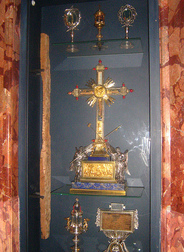The Feast of the Exaltation of the Holy Cross, which, the day after the dedication of the Basilica of the Resurrection raised over the tomb of Christ, is exalted and honored, in the manner of a memorial of His paschal victory and the sign which is to appear in the sky, already announcing in advance His second coming. (Roman Martyrology)
The Church presents to us today a feast which commemorates the discovery of the Holy
 Cross by Emperor Saint Constantine's mother Saint Helena in Jerusalem (AD 325). The Tradition says that Saint Helena found the Cross and the relics of the holy Passion and then brought them to Rome where they are venerated at the Basilica of the Holy Cross in Jerusalem. On the spot of the discovery, she built the Basilica of the Holy Sepulcher keeping a portion of the Cross at there.
Cross by Emperor Saint Constantine's mother Saint Helena in Jerusalem (AD 325). The Tradition says that Saint Helena found the Cross and the relics of the holy Passion and then brought them to Rome where they are venerated at the Basilica of the Holy Cross in Jerusalem. On the spot of the discovery, she built the Basilica of the Holy Sepulcher keeping a portion of the Cross at there.The sacred Liturgy gives us the image of the Holy Cross because it brings together the historical reality of the Cross with its theological import: mystery of the life and death of Christ. This is not a feast celebrating a "terrific find" at an archaeological dig; it is a feast of our faith as the Cross is a central symbol of our faith.
Hymnus in Honore Sanctae Crucis
Vexilla regis prodeunt,
fulget crucis mysterium,
quo carne carnis conditor
suspensus est patibulo.
Confixa clavis viscera
tendens manus, vestigia
redemptionis gratia
hic inmolata est hostia.
Quo vulneratus insuper
mucrone diro lanceae,
ut nos lavaret crimine,
manavit unda et sanguine.
Inpleta sunt quae concinit
David fideli carmine,
dicendo nationibus:
regnavit a ligno deus.
Arbor decora et fulgida,
ornata regis purpura,
electa, digno stipite
tam sancta membra tangere!
Beata cuius brachiis
pretium pependit saeculi!
statera facta est corporis
praedam tulitque Tartari.
Fundis aroma cortice,
vincis sapore nectare,
iucunda fructu fertili
plaudis triumpho nobili.
Salve ara, salve victima
de passionis gloria,
qua vita mortem pertulit
et morte vitam reddidit.
In Festo Exaltationis Sanctae Crucis:
in hac triumphi gloria!
("Vexilla Regis" was written by Venantius Fortunatus (530-609) and is considered one of the greatest hymns of the sacred Liturgy. This is the full hymn but when used liturgically at Vespers verses 2, 4, 7 are omitted.)


Leave a comment